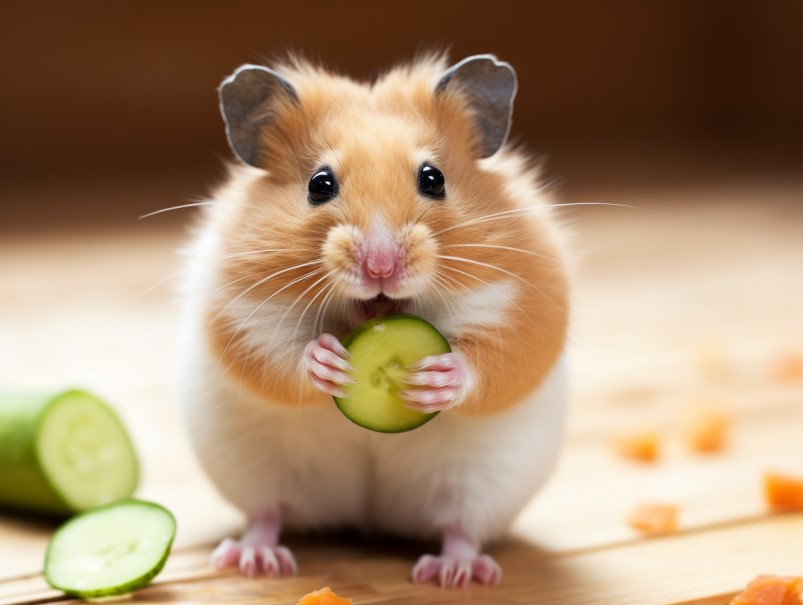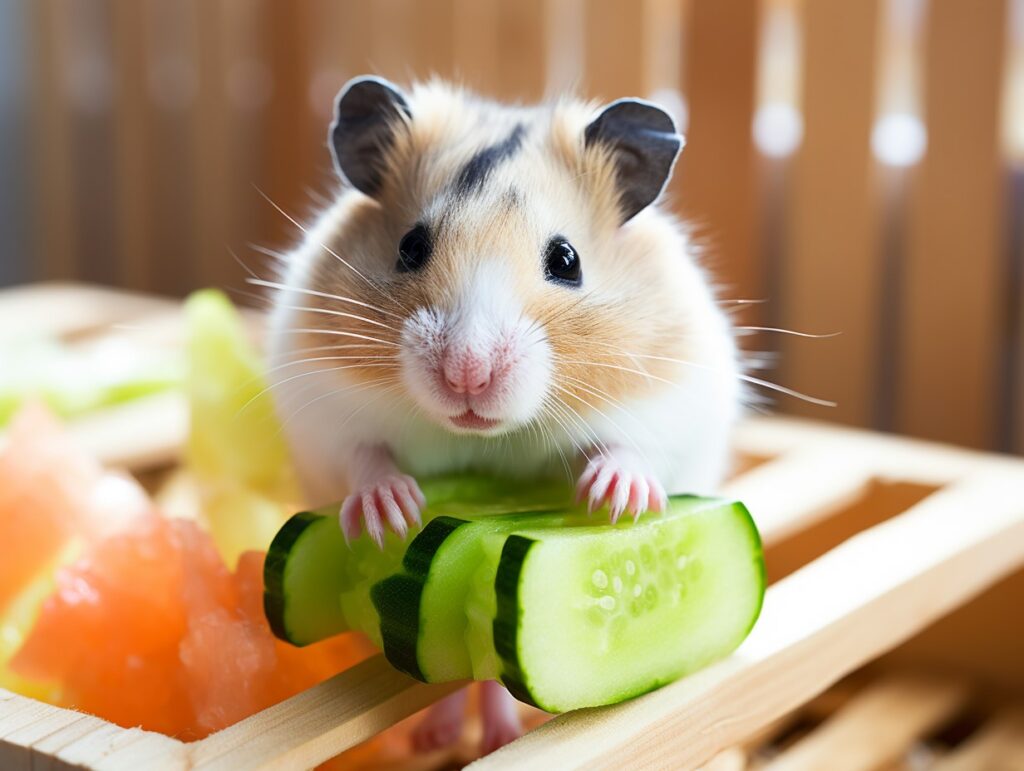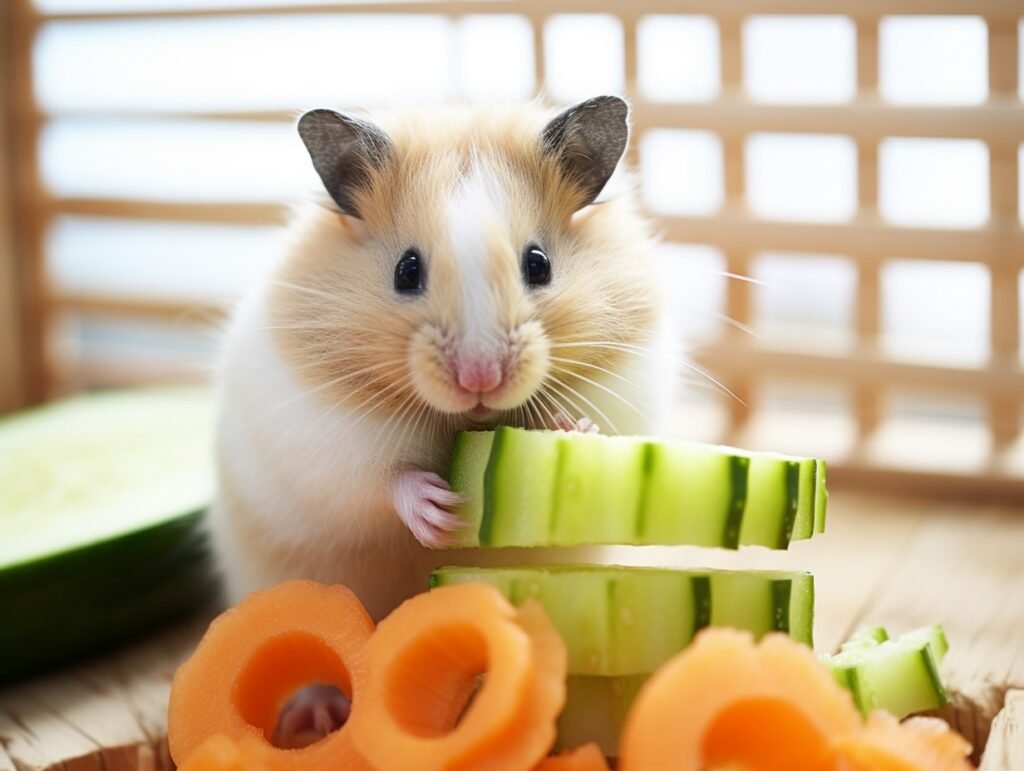Can hamsters eat cucumbers?


As a loving and caring hamster parent, you’re naturally concerned about your little fur ball’s diet and wellbeing. “Can I give my hamster cucumbers?”, you might wonder. Well, here’s some good news for you – yes, cucumbers are safe for your hamster to eat!
Is Cucumber Safe for Hamsters? Exploring Common Concerns
Hamsters are omnivores, which means they can eat both plants and meat. Cucumbers, being a plant product, fit safely into a hamster’s diet. However, before you rush to feed your pet a whole cucumber, it’s important to understand that moderation is key. Just like with any other type of food, feeding your hamster too much cucumber can cause health problems.
The Right Cucumber Serving Size for Hamsters
Hamsters are, by nature, small animals. Consequently, their dietary needs and portion sizes are also quite small. A good rule of thumb is to feed your hamster cucumber slices that are about the size of two raisins. Consider this your hamster’s “cucumber quota” for the day.
Best Type of Cucumbers for Hamsters
When it comes to the type of cucumbers to serve, organic cucumbers are the best option. They are free from harmful pesticides that can cause damage to your hamster’s delicate system. If you can’t find organic cucumbers, thoroughly wash them under running water before feeding them to your hamster.
How Often Should You Feed Your Hamster Cucumbers?
While cucumbers are safe for hamsters, they should not form the bulk of your hamster’s diet. Think of it as a treat rather than a dietary staple. As such, feeding your hamster cucumber slices once or twice a week is more than enough.
Introducing a new food item to your hamster’s diet should be done gradually. This helps to avoid any potential digestive problems, as it allows your hamster’s system to adjust slowly to the new food.
The Role of Fresh Water
Despite cucumbers being mostly water (about 95%), it is crucial that you always provide your hamster with fresh water. Regardless of the watery treat, your hamster should always have easy access to fresh drinking water.
Preparation Tips
- Clean: Always wash the cucumber thoroughly to remove any potential pesticide residue.
- Peel: If you’re concerned about pesticides, you can also peel the cucumber before giving it to your hamster.
- Slice: Cut the cucumber into small, manageable slices that your hamster can easily handle and eat.
- Monitor: Always keep a close eye on your hamster when they are trying a new food for the first time. This way, you can quickly spot any signs of discomfort or allergic reaction.
To sum up, cucumbers are not just safe, but also a hydrating and refreshing treat that your hamster can enjoy. However, remember that moderation is key. Too much of a good thing can quickly turn into a bad thing, especially when it comes to your tiny pet’s diet.
The Health Benefits of Cucumbers for Hamsters


If you’re a hamster parent, you’ve probably asked yourself, “What benefits does a cucumber offer my hamster?” Well, you’re in for a treat. Cucumbers are not only hydrating, but they’re also packed with several health benefits for your little furball. Let’s delve into them.
High in Hydration
Did you know that cucumbers are 95% water? This makes them a perfect snack option for hamsters, especially during hot summer days. Incorporating cucumbers in your hamster’s diet can help keep them hydrated and support kidney function.
Low-Calorie Snack
Hamsters are prone to becoming overweight, which can lead to numerous health issues. Fortunately, cucumbers are low in calories, making them an excellent option for maintaining a healthy weight. So, you can treat your hamster to a crunchy cucumber snack without worrying about excessive weight gain.
Rich in Vitamins and Minerals
Cucumbers are a good source of essential vitamins and minerals that your hamster needs for optimal health. They contain Vitamin K, which aids in blood clotting, Vitamin A, essential for good vision, and Vitamin C, which boosts the immune system. Additionally, cucumbers have potassium, which helps regulate blood pressure and support heart health.
High in Antioxidants
Antioxidants are important for protecting your hamster’s body from damage caused by free radicals. Cucumbers are high in various antioxidant substances, including flavonoids and tannins, which can help protect your hamster from diseases.
Good for Digestion
Cucumbers can be a good addition to your hamster’s diet if they experience digestion issues. The water content in cucumbers can help maintain a healthy digestive system and prevent constipation.
Keeps Teeth Healthy
Did you know your hamster’s teeth never stop growing? Chewing on crunchy foods such as cucumbers can help keep their teeth at a reasonable length.
Remember: Even with all these fantastic benefits, cucumbers should not replace a balanced, varied diet for your hamster. Always consult a vet for dietary advice tailored to your individual pet’s needs.
- High in Hydration: Cucumbers are 95% water, making them a hydrating snack option for hamsters.
- Low-Calorie Snack: Cucumbers are low in calories, helping your hamster maintain a healthy weight.
- Rich in Vitamins and Minerals: Cucumbers contain essential vitamins and minerals for optimal health.
- High in Antioxidants: Cucumbers are high in antioxidants, protecting your hamster from diseases.
- Good for Digestion: The water content in cucumbers can help maintain a healthy digestive system.
- Keeps Teeth Healthy: Chewing on cucumbers can help keep your hamster’s teeth at a reasonable length.
Feeding your hamster cucumbers can be beneficial, but it should be done in moderation. After all, too much of a good thing can be bad. Always keep an eye on your pet’s reaction to new foods, and adjust their diet accordingly.
How to Safely Introduce Cucumbers to Your Hamster’s Diet


So, you’ve learned that cucumbers are safe for your furry friend, and you’re ready to introduce this refreshing food to their diet. Great! Still, there’s a right way to go about it. Let’s walk you through it.
Step 1: Select the Right Cucumber
First things first, always go for fresh cucumbers. The fresher the cucumber, the more beneficial nutrients it has. Plus, it’s just tastier and more enjoyable for your hamster. Try to choose organic cucumbers if possible, as these have not been treated with pesticides that could potentially harm your hamster.
Step 2: Prepare the Cucumber
Thoroughly wash the cucumber under running water to clean off any dirt or chemicals. Then, cut off a small slice. It’s important to remember that cucumbers should only make up a small portion of your hamster’s diet, so a little goes a long way.
Step 3: Serve the Cucumber
Now it’s time for the fun part – serving! Place the small slice in your hamster’s food dish. Do avoid adding extra seasonings or dressings. Hamsters don’t need these, and in fact, additives like salt or salad dressing could be harmful to them.
Step 4: Monitor Your Hamster
This step is crucial. After your hamster has eaten the cucumber, keep an eye on them. Look out for any changes in their behavior or signs of discomfort. If your hamster seems unwell after eating, it might be best to remove it from their diet and consult a vet.
Remember the Golden Rule
The golden rule when introducing any new food to your hamster’s diet is: start small. Give your hamster a tiny piece of cucumber to start with and monitor their reaction. If they seem to enjoy it and don’t show any signs of discomfort, you can gradually add more to their diet over time.
Handling Leftovers
If your hamster doesn’t finish their cucumber, it’s essential to remove the leftovers from their cage promptly. This prevents the food from going bad and causing potential health problems for your pet.
Introducing cucumbers to your hamster’s diet can be a great way to add variety and essential nutrients. Remember to take it slowly and always put your hamster’s health first. Happy feeding!
Potential Risks and Side Effects of Feeding Cucumbers to Hamsters
While it’s true that cucumbers can be a great supplement to your hamster’s diet, it’s also important to be aware of the potential risks and side effects that might come with feeding your little furry friend this particular green veggie. Remember, moderation is key, and too much of a good thing can sometimes turn bad.
Digestive Issues
Cucumbers, like many other fruits and vegetables, are high in water content. While this can be beneficial for hydration, too much can lead to diarrhea in hamsters. If you notice that your hamster is experiencing loose stools after introducing cucumbers into their diet, it might be best to cut back on the amount or frequency that you’re offering this treat.
Nutritional Imbalance
Hamsters need a balanced diet, rich in grains, seeds, and a small amount of fresh produce. Relying too heavily on cucumbers could lead to a nutritional imbalance. Although cucumbers are nutritious, they don’t contain all the necessary nutrients that a hamster needs. Be sure to balance their diet with an assortment of other foods.
Choking Hazard
Although cucumbers are soft and easy to chew, it’s still possible for a tiny piece to become a choking hazard for your hamster. Always supervise your hamster when they’re eating and chop up the cucumber into small, manageable pieces that are easy for your pet to handle.
Pesticide Exposure
Unfortunately, many fruits and vegetables, including cucumbers, are sprayed with pesticides during the growing process. These chemicals can be harmful to hamsters. Always wash your cucumbers thoroughly before feeding them to your hamster, or better yet, opt for organic cucumbers to reduce the risk of pesticide exposure.
How to Mitigate These Risks
Now that we’ve covered some of the potential risks, let’s talk about how you can mitigate these issues. Here are a few expert tips:
- Introduce cucumbers slowly: Start with a small piece and monitor your hamster for any adverse reactions.
- Maintain variety in their diet: Don’t over-rely on cucumbers. Mix in other fruits, vegetables, and grains.
- Prepare the food properly: Wash it thoroughly and cut it into small, manageable pieces.
In conclusion, while cucumbers can be a great addition to your hamster’s diet, they are not without risks. The key is to introduce them slowly, make sure they are properly washed and prepared, and maintain variety in your hamster’s diet. Always monitor your pet for any changes in behavior or stool consistency and don’t hesitate to consult with a vet if you have any concerns.
Other Healthy Foods to Include in Your Hamster’s Diet
Just like us humans, hamsters love variety and trying out new foods. While cucumbers are a terrific addition to your hamster’s diet, there are quite a few other healthy food options you can explore
| Category | Food | Notes |
|---|---|---|
| Vegetables | Cucumbers | Introduce new foods gradually. |
| Carrots | Rich in vitamins, serve in moderation due to high sugar content. | |
| Broccoli | Contains vitamin C and fiber. Beware of potential gas. | |
| Bell Peppers | Vitamin C-rich; remove seeds before feeding. | |
| Fruits | Apples | Feed small pieces without seeds; vitamin-rich treat. |
| Pears | Occasional fruit treat, watch the sugar content. | |
| Berries (Strawberries, Raspberries, Blueberries, etc.) | Occasional fruit treat, watch sugar content. | |
| Proteins | Cooked Chicken or Turkey | Small portion of unseasoned meat for a protein boost. |
| Mealworms | Excellent protein source, often enjoyed by hamsters. | |
| Grains | Whole Grain Bread | Small amount for fiber, ensure no added sugars. |
| Pasta | A piece of unseasoned, cooked pasta can be a nice treat. |
Remember, variety is the spice of life! Changing things up keeps your hamster interested and excited about their meals. However, make sure to introduce new foods gradually, and always monitor your hamster’s reaction to them. If you notice any changes in their behavior or droppings, it’s best to remove that food item from their diet.
Your pet hamster depends on you for all their nutritional needs, so it’s important to take this responsibility seriously. By providing a well-rounded diet, you’re not just keeping them alive; you’re helping them to thrive.
Frequently Asked Questions (FAQ)
Q: Can hamsters eat cucumbers, and are cucumbers a suitable addition to their diet?
Yes, hamsters can eat cucumbers in moderation. Cucumbers can be a safe and hydrating treat for hamsters when included in a balanced diet.
Q: What’s the appropriate serving size and frequency for cucumbers when feeding them to hamsters?
A small slice of cucumber, approximately the size of two raisins, is a suitable serving size for hamsters. Cucumber slices can be offered once or twice a week as a treat.
Q: What precautions should I take when feeding cucumbers to my hamster, and how can I mitigate potential risks?
Precautions include washing cucumbers thoroughly, serving them without added seasonings, and monitoring your hamster for adverse reactions. To mitigate risks, start with a small amount, maintain diet variety, prepare cucumbers properly, and watch for any negative responses.
Q: What are the potential health benefits of cucumbers for hamsters?
Cucumbers are hydrating, low in calories, and rich in vitamins and minerals, making them a beneficial addition to support your hamster’s health.
Q: What are the potential risks associated with feeding cucumbers to hamsters?
Risks include digestive issues, nutritional imbalance if overfed, choking hazard, and potential pesticide exposure.
Q: What other foods can I include in my hamster’s diet for variety and nutrition?
You can offer a variety of vegetables (carrots, broccoli, bell peppers), fruits (apples, pears, berries), proteins (cooked chicken or turkey, mealworms), and grains (whole grain bread, pasta) to maintain a balanced and interesting diet for your hamster.
Q: How should I introduce new foods to my hamster’s diet, and what should I do if my hamster experiences digestive issues?
New foods should be introduced gradually, starting with small portions. Monitor your hamster for reactions. If digestive issues occur, reduce cucumber treats, and if problems persist, consult a veterinarian.



